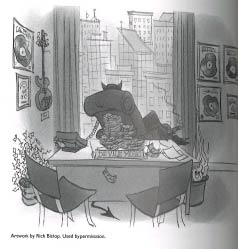Why should the devil have all the good music? This pithy question is often used to justify the introduction of “secular” musical styles into the church service. Variously attributed to Martin Luther, John Wesley, and Salvation Army founder William Booth, the saying cannot be documented in any of their writings. Indeed, whatever Booth’s views might have been, the question most certainly does not reflect the ideas or practices of Luther and Wesley.
Regardless of its origin, the phrase is one of those sayings that seems to make a telling point in a few words and allows for no “comeback.” However, those who glibly use the question may not realize that they are making some rather unfortunate claims about the very music they are trying to defend.
1. The devil has all the good music.
Since the question is a rhetorical one, the answer is intended to be evident:
Q: Why should the devil have all the good music?
A: He shouldn’t; we should have it too.
But this rhetorical question might well be answered with another: Why would we want anything that belongs to the devil? Has God not given us all the tools and devices that we could ever need or want for our work? Must we lust after the devil’s equipment too? If we want to start a fire in our churches, are we to get the coals from hell? On the contrary, Scripture tells us that Jesus came to “destroy the works of the devil” (1 John 3:8) and commands us to “resist the devil” (James 4:7), not raid his toolbox.
2. The devil has all the good music.
If the devil owns it, it cannot be good. God is the giver of “every good and perfect gift” (James 1:17). He created everything—including the world of sound—and pronounced it good. The devil’s business, on the other hand, is perversion and twisting of good into what is evil. He transforms worship into idolatry, love into legalism, and a manger into a cross. Certainly, we live in a fallen world in which everything—even the world of sound that God created—is in an imperfect state. No music measures up to God. But to call any music that belongs to the devil “good” ignores the basic character of the adversary.

3. The devil has all the good music.
Even if the devil may be said to own any “good” music (however that may be defined), he manifestly does not own all of it. The implication is that only the kind of music owned by the devil constitutes “good” music. But suggesting that, for example, only historic hymns and choral works are “good” church music ignores the fact that God is still at work through the Holy Spirit in today’s composers and songwriters. On the other hand, if only pieces in contemporary pop style are “good” church music, we can marvel at the many centuries that have elapsed since the Ascension during which there was evidently no true musical worship going on.
Those who ask, “Why should the devil have all the good music?” undoubtedly intend to say that the devil has perverted God’s good gift of music, which must be restored to its proper use. This is well and good; after all, we too were captives to Satan and have been rescued for good ends. But it may well be asked if a “secular” musical style is really the work of the devil or simply another manifestation of God’s gift of music. If it has indeed been polluted by the devil (through association with evil, for instance), we may then ask if it is appropriate to offer this back to God without substantial change.
Perhaps it is time for this pithy saying—together with the legend that Martin Luther borrowed barroom tunes for his hymns—to be put to rest. If we want to use “secular” styles in worship, let us acknowledge that these too are gifts of God, not something we have to obtain from the devil.

